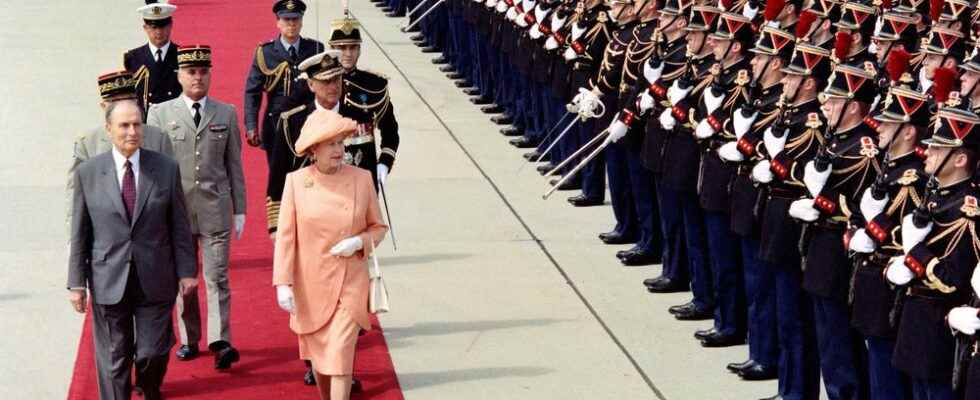Perfectly French-speaking, Elizabeth II liked to meet the French presidents, with whom she always generally got along, even if some had not properly revised the very strict protocol of the British monarchy.
Let’s start this overview with Charles de Gaulle, who was not one to make blunders. In 1960, the first president of the Fifth Republic traveled to London, where he was expected on the station platform by the entire royal family. If he was always wary of Great Britain – he would never accept her entering the Common Market – he shows a lot of respect and deference towards Elizabeth II, who knows how to seduce him: “Mr. President , I raise my glass to the greatness and happiness of France”, she proclaims during the opening of the evening organized at Buckingham Palace. To which de Gaulle responds soberly: “Madam, I drink to the prosperity of the United Kingdom and the Commonwealth”.
But in the middle of this protocol made of respect and kindness, an anecdote remained in the memories of the English press. It concerns Yvonne de Gaulle, the wife of the French president, to whom a guest would have asked what she expected from retirement. In an English tinged with a strong French accent, she would have pronounced “a penis” meaning “happiness” (happiness), which had the merit of disconcerting the assistance. The queen would then have come to the aid of her guest, exclaiming: “Ah! Happiness!”. Whether true or not, this story remains, for the British, inseparable from Charles de Gaulle’s visit to England.
His successor, Georges Pompidou, has, him, made a mistake by taking the arm of the queen when she climbed the steps of the Elysée. A gesture of affection which is then perceived, across the Channel, as being very inappropriate, any Briton knowing well that it is forbidden to touch the sovereign. The latter will not hold it against the French president. The name of Valéry Giscard d’Estaing he remains closely associated with Princess Diana, much more than that of Elizabeth II, with whom he maintained correct relations without being very warm. In 2009, the former president released a novel entitled The Princess and the President, in which he recounts the amorous passion between a French president and the Princess of Cardiff. The epigraph “Promise kept” will only accentuate the birth of a crazy rumor: VGE and Lady Diana would have had a love affair. The author will admit very quickly that it is not a real story, but the legend will continue, which was certainly not to the taste of the queen.
Mitterrand the friend, Chirac the joker
Elizabeth II and François Mitterrand reviewing the Republican Guard, in 1992.
AFP
The president with whom she got along the best is without a doubt François Mitterrand, a British history buff whose left-wing sensibilities appealed to the Queen, who was used to rubbing shoulders with Conservative prime ministers. In 1992, she summed up the relationship between Anglo-Saxon and Latin culture with a pleasant metaphor: “The Anglo-Saxon tradition is a bit to the Latin tradition what oil is to vinegar: it takes both to make the sauce , otherwise the salad is badly seasoned”. Full of sense of humor, Elizabeth II should not have blamed Jacques Chirac, who seems to have behaved towards the queen as towards an old comrade. Arrived late at a dinner given in his honor at Buckingham Palace, he would have indeed allowed himself a joke of the clumsy kind, according to legend. As they were riding in a carriage, the Queen apologized to him after a horse had flatulence. To which Chirac would have replied: “It doesn’t matter, Majesty, I thought it was the horse”. True or not, the anecdote is remembered.
Less comfortable was certainly Francois Hollande, who, during a dinner, left the queen alone at the table, in order to go and speak with… Vladimir Putin. As for François Hollande’s predecessor, NOTNicolas Sarkozy, he would have gone to bed before the queen. Re Emmanuel Macron, who met an already very old sovereign, we will remember her original gift during Elizabeth II’s platinum jubilee: a Republican Guard horse. Often presented as a republican monarchy, France seems to have, at times, forgotten part of its past, and the demanding ceremonial codes that accompany royal regimes.
